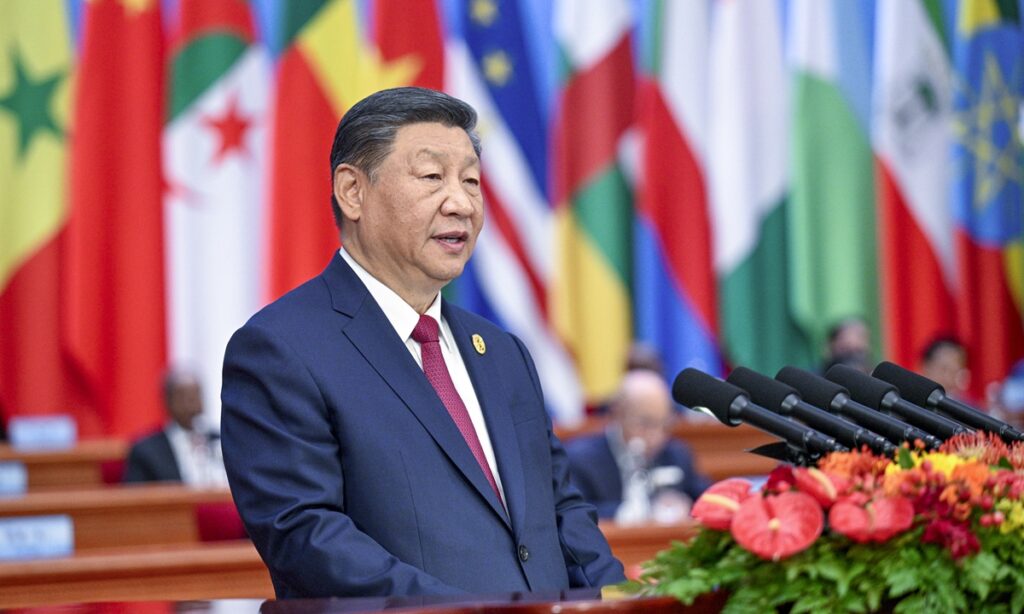China, African countries elevate ties to strategic relations
Chinese President Xi Jinping on Thursday said that China stands ready to work with Africa to implement 10 partnership actions to jointly advance modernization. He also proposed that bilateral relations between China and all African countries having diplomatic ties with China be elevated to the level of strategic relations, and that the overall characterization of China-Africa relations be elevated to an all-weather China-Africa community with a shared future for the new era.
Xi made the remarks when delivering a keynote speech at the opening ceremony of the 2024 Summit of the Forum on China-Africa Cooperation (FOCAC) in Beijing.
Forum attendees and observers hailed the elevation of ties as a visionary guidance for the future and were impressed by the concrete, across-the-board blueprint that will be able to yield substantial benefits to Africa, boost modernization shoulder to shoulder, and bring China-Africa cooperation to new heights.
Substantial actions
A declaration on jointly building an all-weather China-Africa community with a shared future for the new era and an action plan of the FOCAC for the next three years were adopted Thursday at the 2024 FOCAC summit in Beijing.
The action plan, to be implemented in the next three years, covers the areas of mutual learning among civilizations, trade prosperity, industrial chain cooperation, connectivity, development cooperation, healthcare, rural revitalization and people’s wellbeing, people-to-people exchanges, green development and common security, according to the action plan.
It covers basically all aspects of modernization, reflecting China’s confidence and sincerity in promoting modernization with Africa, Song Wei, a professor at the School of International Relations and Diplomacy at Beijing Foreign Studies University, told the Global Times.
To ensure the successful implementation of the 10 partnership initiatives, China will provide Africa with 360 billion yuan ($50.69 billion) in the next three years. Per the action plan, China will grant duty-free treatment to 100% of the tariff lines of products from least developed countries with diplomatic ties with China.
China will voluntarily and unilaterally open its market wider. The move makes China the first major developing country and the first major economy to take such a step and will help turn China’s big market into Africa’s big opportunity, Xi noted in his keynote speech.
China will help implement 30 infrastructure projects in Africa, build a multimodal sea-rail transport network that connects China’s central and western regions to Africa and deepen cooperation with the continent in local currency settlement and financial technology.
Also under the action plan, China will send 2,000 medical personnel and public health experts and 500 agricultural experts, implement 20 healthcare and malaria treatment programs, and 30 clean energy and green development projects, encourage Chinese businesses in Africa to create no less than 1 million local jobs, and provide 60,000 training opportunities with priority given to programs for women’s empowerment and youth development.
China will join hands with Africa to establish and implement a Global Security Initiative partnership by providing military grants, training military personnel and inviting African military officers to visit China and conduct exercises and patrols.
Munetsi Madakufamba, executive director of the Zimbabwe-based Southern African Research and Documentation Centre, was impressed by the governance experience-sharing in the action plan.
By inviting 1,000 African political party personages to China for exchanges, China is offering an alternative model for Africa to benchmark on and to see how this can be adapted to each country’s own context and circumstances, Madakufamba told Global Times.
Adetoro Banwo, Deputy Director of the Confucius Institute at the University of Lagos, Nigeria, told the Global Times that the plan targets key areas of cooperation and is expected to deepen economic ties and increase trade and investment for both countries. The plans will also facilitate technological and knowledge transfers, bridging gaps and encouraging innovation.
Hamad Alhosani from Abu Dhabi-headquartered research institute TRENDS Research and Advisory underlined that China’s engagement is a means to empower African nations, supporting their aspirations for prosperity and development.
“Ultimately, this collaboration can lead to mutual benefit and long-term growth,” he said.
Toward a shared future
Sena Voncujovi, an Africa-China relations analyst from Ghana at Development Reimagined, told the Global Times that one important aspect for the “all-weather China-Africa community with a shared future for the new era” will be inclusive economic globalization.
“Today, the majority of our partnerships is in manufacturing. This is helping Africa to industrialize, is helping Africa’s agriculture to modernize and is helping the African continent to integrate into global supply chains,” Voncujovi said.
Alhosani from TRENDS understands the concept as being one of solidarity. Under the current international landscape, marked by geopolitical tensions and shifting alliances, FOCAC, with a mass gathering and fruitful results, emphasizes cooperation over confrontation, highlighting China as a key partner of Africa.
The elevation of relationship showcases China’s determination and commitment to further align and develop its national strategies with African countries, Song said.
RSS




